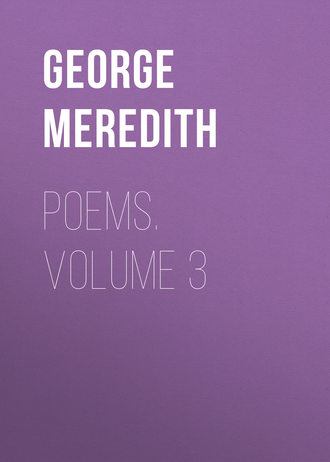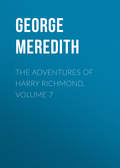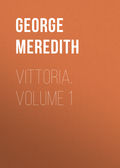полная версия

George Meredith
Poems. Volume 3
IRELAND
Fire in her ashes Ireland feels
And in her veins a glow of heat.
To her the lost old time, appeals
For resurrection, good to greet:
Not as a shape with spectral eyes,
But humanly maternal, young
In all that quickens pride, and wise
To speak the best her bards have sung.
You read her as a land distraught,
Where bitterest rebel passions seethe.
Look with a core of heart in thought,
For so is known the truth beneath.
She came to you a loathing bride,
And it has been no happy bed.
Believe in her as friend, allied
By bonds as close as those who wed.
Her speech is held for hatred’s cry;
Her silence tells of treason hid:
Were it her aim to burst the tie,
She sees what iron laws forbid.
Excess of heart obscures from view
A head as keen as yours to count.
Trust her, that she may prove her true
In links whereof is love the fount.
May she not call herself her own?
That is her cry, and thence her spits
Of fury, thence her graceless tone
At justice given in bits and bits.
The limbs once raw with gnawing chains
Will fret at silken when God’s beams
Of Freedom beckon o’er the plains
From mounts that show it more than dreams.
She, generous, craves your generous dole;
That will not rouse the crack of doom.
It ends the blundering past control
Simply to give her elbow-room.
Her offspring feels they are a race,
To be a nation is their claim;
Yet stronger bound in your embrace
Than when the tie was but a name.
A nation she, and formed to charm,
With heart for heart and hands all round.
No longer England’s broken arm,
Would England know where strength is found.
And strength to-day is England’s need;
To-morrow it may be for both
Salvation: heed the portents, heed
The warnings; free the mind from sloth.
Too long the pair have danced in mud,
With no advance from sun to sun.
Ah, what a bounding course of blood
Has England with an Ireland one!
Behold yon shadow cross the downs,
And off away to yeasty seas.
Lightly will fly old rancour’s frowns
When solid with high heart stand these.
THE YEARS HAD WORN THEIR SEASONS’ BELT
The years had worn their seasons’ belt,
From bud to rosy prime,
Since Nellie by the larch-pole knelt
And helped the hop to climb.
Most diligent of teachers then,
But now with all to learn,
She breathed beyond a thought of men,
Though formed to make men burn.
She dwelt where ’twixt low-beaten thorns
Two mill-blades, like a snail,
Enormous, with inquiring horns,
Looked down on half the vale.
You know the grey of dew on grass
Ere with the young sun fired,
And you know well the thirst one has
For the coming and desired.
Quick in our ring she leapt, and gave
Her hand to left, to right.
No claim on her had any, save
To feed the joy of sight.
For man and maid a laughing word
She tossed, in notes as clear
As when the February bird
Sings out that Spring is near.
Of what befell behind that scone,
Let none who knows reveal.
In ballad days she might have been
A heroine rousing steel.
On us did she bestow the hour,
And fixed it firm in thought;
Her spirit like a meadow flower
That gives, and asks for nought.
She seemed to make the sunlight stay
And show her in its pride.
O she was fair as a beech in May
With the sun on the yonder side.
There was more life than breath can give,
In the looks in her fair form;
For little can we say we live
Until the heart is warm.
FRAGMENTS
Open horizons round,
O mounting mind, to scenes unsung,
Wherein shall walk a lusty Time:
Our Earth is young;
Of measure without bound;
Infinite are the heights to climb,
The depths to sound.
A wilding little stubble flower
The sickle scorned which cut for wheat,
Such was our hope in that dark hour
When nought save uses held the street,
And daily pleasures, daily needs,
With barren vision, looked ahead.
And still the same result of seeds
Gave likeness ’twixt the live and dead.
From labours through the night, outworn,
Above the hills the front of morn
We see, whose eyes to heights are raised,
And the world’s wise may deem us crazed.
While yet her lord lies under seas,
She takes us as the wind the trees’
Delighted leafage; all in song
We mount to her, to her belong.
This love of nature, that allures to take
Irregularity for harmony
Of larger scope than our hard measures make,
Cherish it as thy school for when on thee
The ills of life descend.
IL Y A CENT ANS
That march of the funereal Past behold;
How Glory sat on Bondage for its throne;
How men, like dazzled insects, through the mould
Still worked their way, and bled to keep their own.
We know them, as they strove and wrought and yearned;
Their hopes, their fears; what page of Life they wist:
At whiles their vision upon us was turned,
Baffled by shapes limmed loosely on thick mist.
Beneath the fortress bulk of Power they bent
Blunt heads, adoring or in shackled hate,
All save the rebel hymned him; and it meant
A world submitting to incarnate Fate.
From this he drew fresh appetite for sway,
And of it fell: whereat was chorus raised,
How surely shall a mad ambition pay
Dues to Humanity, erewhile amazed.
’Twas dreamed by some the deluge would ensue,
So trembling was the tension long constrained;
A spirit of faith was in the chosen few,
That steps to the millennium had been gained.
But mainly the rich business of the hour,
Their sight, made blind by urgency of blood,
Embraced; and facts, the passing sweet or sour,
To them were solid things that nought withstood.
Their facts are going headlong on the tides,
Like commas on a line of History’s page;
Nor that which once they took for Truth abides,
Save in the form of youth enlarged from age.
Meantime give ear to woodland notes around,
Look on our Earth full-breasted to our sun:
So was it when their poets heard the sound,
Beheld the scene: in them our days are one.
What figures will be shown the century hence?
What lands intact? We do but know that Power
From piety divorced, though seen immense,
Shall sink on envy of the humblest flower.
Our cry for cradled Peace, while men are still
The three-parts brute which smothers the divine,
Heaven answers: Guard it with forethoughtful will,
Or buy it; all your gains from War resign.
A land, not indefensibly alarmed,
May see, unwarned by hint of friendly gods,
Between a hermit crab at all points armed,
And one without a shell, decisive odds.
YOUTH IN AGE
Once I was part of the music I heard
On the boughs or sweet between earth and sky,
For joy of the beating of wings on high
My heart shot into the breast of the bird.
I hear it now and I see it fly,
And a life in wrinkles again is stirred,
My heart shoots into the breast of the bird,
As it will for sheer love till the last long sigh.
EPITAPHS
TO A FRIEND LOST
(TOM TAYLOR)
When I remember, friend, whom lost I call,
Because a man beloved is taken hence,
The tender humour and the fire of sense
In your good eyes; how full of heart for all,
And chiefly for the weaker by the wall,
You bore that lamp of sane benevolence;
Then see I round you Death his shadows dense
Divide, and at your feet his emblems fall.
For surely are you one with the white host,
Spirits, whose memory is our vital air,
Through the great love of Earth they had: lo, these,
Like beams that throw the path on tossing seas,
Can bid us feel we keep them in the ghost,
Partakers of a strife they joyed to share.
M. M
Who call her Mother and who calls her Wife
Look on her grave and see not Death but Life.
THE LADY C. M
To them that knew her, there is vital flame
In these the simple letters of her name.
To them that knew her not, be it but said,
So strong a spirit is not of the dead.
ON THE TOMBSTONE OF JAMES CHRISTOPHER WILSON
(d. APRIL 11, 1884)
IN HEADLEY CHURCHYARD, SURREY
Thou our beloved and light of Earth hast crossed
The sea of darkness to the yonder shore.
There dost thou shine a light transferred, not lost,
Through love to kindle in our souls the more.
GORDON OF KHARTOUM
Of men he would have raised to light he fell:
In soul he conquered with those nerveless hands.
His country’s pride and her abasement knell
The Man of England circled by the sands.
J. C. M
A fountain of our sweetest, quick to spring
In fellowship abounding, here subsides:
And never passage of a cloud on wing
To gladden blue forgets him; near he hides.
THE EMPEROR FREDERICK OF OUR TIME
With Alfred and St. Louis he doth win
Grander than crowned head’s mortuary dome:
His gentle heroic manhood enters in
The ever-flowering common heart for home.
ISLET THE DACHS
Our Islet out of Helgoland, dismissed
From his quaint tenement, quits hates and loves.
There lived with us a wagging humourist
In that hound’s arch dwarf-legged on boxing-gloves.
ON HEARING THE NEWS FROM VENICE
(THE DEATH OF ROBERT BROWNING)
Now dumb is he who waked the world to speak,
And voiceless hangs the world beside his bier.
Our words are sobs, our cry of praise a tear:
We are the smitten mortal, we the weak.
We see a spirit on Earth’s loftiest peak
Shine, and wing hence the way he makes more clear:
See a great Tree of Life that never sere
Dropped leaf for aught that age or storms might wreak.
Such ending is not Death: such living shows
What wide illumination brightness sheds
From one big heart, to conquer man’s old foes:
The coward, and the tyrant, and the force
Of all those weedy monsters raising heads
When Song is murk from springs of turbid source.
December 13, 1889.
HAWARDEN
When comes the lighted day for men to read
Life’s meaning, with the work before their hands
Till this good gift of breath from debt is freed,
Earth will not hear her children’s wailful bands
Deplore the chieftain fall’n in sob and dirge;
Nor they look where is darkness, but on high.
The sun that dropped down our horizon’s verge
Illumes his labours through the travelled sky,
Now seen in sum, most glorious; and ’tis known
By what our warrior wrought we hold him fast.
A splendid image built of man has flown;
His deeds inspired of God outstep a Past.
Ours the great privilege to have had one
Among us who celestial tasks has done.
AT THE FUNERAL
FEBRUARY 2, 1901
Her sacred body bear: the tenement
Of that strong soul now ranked with God’s Elect
Her heart upon her people’s heart she spent;
Hence is she Royalty’s lodestar to direct.
The peace is hers, of whom all lands have praised
Majestic virtues ere her day unseen.
Aloft the name of Womanhood she raised,
And gave new readings to the Title, Queen.
ANGELA BURDETT-COUTTS
Long with us, now she leaves us; she has rest
Beneath our sacred sod:
A woman vowed to Good, whom all attest,
The daylight gift of God.
THE YEAR’S SHEDDINGS
The varied colours are a fitful heap:
They pass in constant service though they sleep;
The self gone out of them, therewith the pain:
Read that, who still to spell our earth remain.







